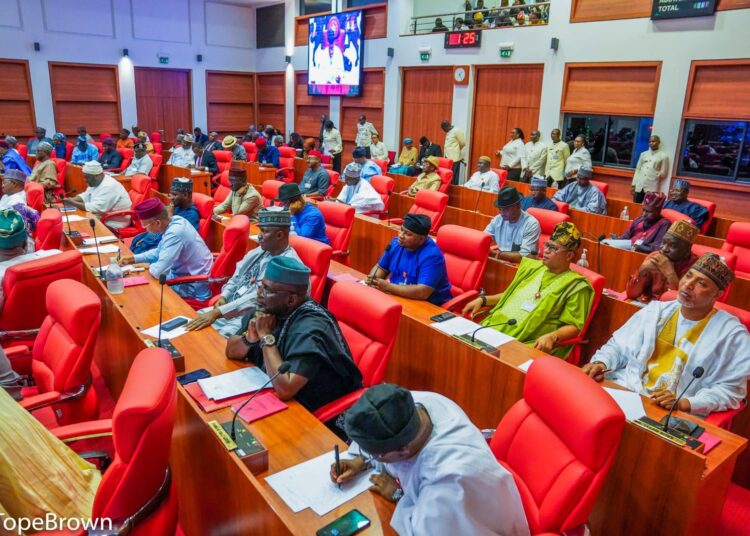The Senate, on Wednesday, passed a Bill to establish the National Animal Husbandry and Ranches Commission for a second reading after a heated debate at plenary.
The Bill, titled; ‘A Bill for an Act for the Regulation of Animal Husbandry and Ranches Establishment in Nigeria as a Panacea for Farmers-Herders Crises’, was sponsored by Senator Titus Tartenger Zam representing Benue North-West.
The piece of legislation, if passed into law, is to control and regulate cattle rearing and ranching business across the country, including establishing ranches in the Pastoralists’ states of origin.
He also opined that the Commission, if established, will serve as an antidote for the perennial violent clashes between sedentary farmers and nomadic herders in Nigeria.
Debating on the general principles of the Bill, Senator Zam noted that the absence of a regulatory framework or legislation on pastoralism and livestock mobility generally has created a chaotic scenario of Survival of the Fittest, between sedentary farmers and nomadic herders in Nigeria, saying the situation was unacceptable in the 21st century civilized world.
“As stakeholders in the Nigeria project and elected representatives of the people, we cannot afford to look on while the country burns into ashes as a result of violent clashes between sedentary farmers and nomadic herders.
“Doing so would amount to abdication of our statutory and leadership responsibilities. The menace of farmers and herders crises can easily be cured through a legislative therapy banning open grazing in Nigeria,” the lawmaker argued.
Zam added that it was, therefore, time to put a permanent stop to the endless circle of attacks and counter attacks by the people and their external collaborators.
“Mr. President, now is the time to adopt international best practices in animal husbandry. My distinguished colleagues, now is the time to bring about a law to stop open grazing. It is old fashioned, hazardous, burdensome and must be discarded,” he stated.
He further argued based on four key provisions in the Bill, which proposes ranching as the only viable alternative for cattle breeding in Nigeria; advocates for the urgent need to transit from traditional livestock keeping method to the modern methods which are safer and healthier to both the herds and the herders; proposes that ranches be established in the pastoralists state of origin without forcing it upon other states or communities that do not have pastoralists as citizens, and proposes that interested parties in livestock business must seek and obtain approvals of their host communities to establish ranches for the purpose of peaceful co-existence.
The Bill, however, met stiff opposition from some Senators from the North as Danjuma Goje (APC, Gombe Central), his counterpart from Kebbi State, Senator Adamu Aliero, and Kano South Senator, Abdulrahman Kawu Sumaila (NNPP, Kano) kicked against restricting pastoralists to grazing in their states of origin instead of the whole country’s expanse of land.
They cited violations of the 1999 Constitution (as amended) and ECOWAS protocols on people’s movements as reasons form their objection to the Bill which, according to them, was discriminatory.
They argued that cattle rearing and ranching activities were more in the North than in other parts of the country, reasoning that lawmaking should be for the entire country and not for a section or part of Nigeria.
Goje specifically maintained that cattle routes begin from the far north and end in Lokoja as “the route does not extend to the South”.
In his contribution, Senator Hussein Babangida Uba, representing Jigawa North-West, called for extra caution in passing the Bill given its trail of controversies in the past.
However, other Senators, who supported the Bill contended that the proposed Commission would manage the farmers/herders crisis, hence, it should be passed into law.
The Bill was eventually passed after it was put to voice votes by the Senate President, Godswill Akpabio.
It was thereafter referred to the Joint Senate Committee on Agriculture, and Judiciary and Legal Matters for further legislative input. The committee was asked to revert back to the Senate at plenary in four weeks.





